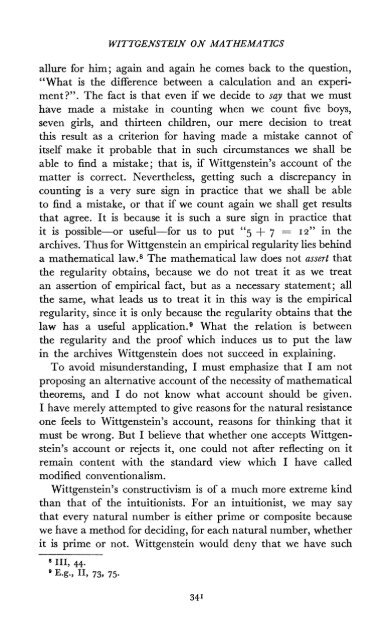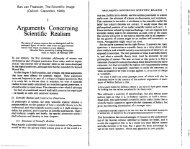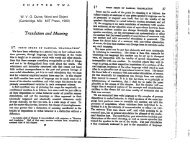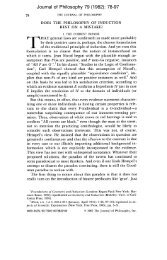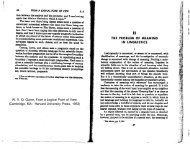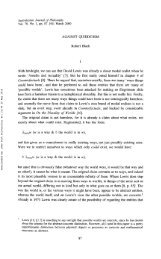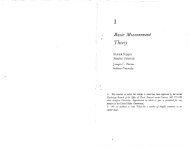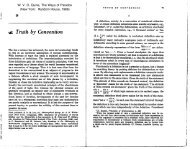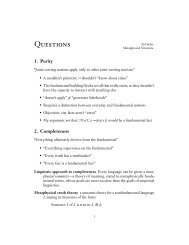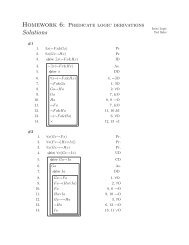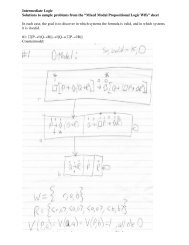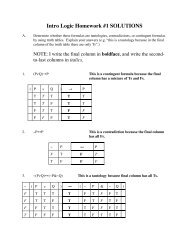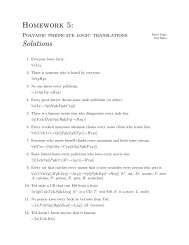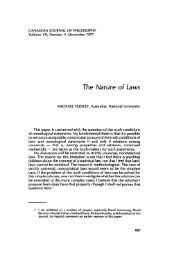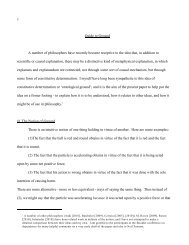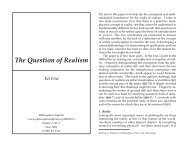Dummett - Wittgenstein's Philosophy of Mathematics.pdf - Ted Sider
Dummett - Wittgenstein's Philosophy of Mathematics.pdf - Ted Sider
Dummett - Wittgenstein's Philosophy of Mathematics.pdf - Ted Sider
Create successful ePaper yourself
Turn your PDF publications into a flip-book with our unique Google optimized e-Paper software.
WITTGENSTEIN ON MA THEMA TICS<br />
allure for him; again and again he comes back to the question,<br />
"What is the difference between a calculation and an experi-<br />
ment?". The fact is that even if we decide to say that we must<br />
have made a mistake in counting when we count five boys,<br />
seven girls, and thirteen children, our mere decision to treat<br />
this result as a criterion for having made a mistake cannot <strong>of</strong><br />
itself make it probable that in such circumstances we shall be<br />
able to find a mistake; that is, if <strong>Wittgenstein's</strong> account <strong>of</strong> the<br />
matter is correct. Nevertheless, getting such a discrepancy in<br />
counting is a very sure sign in practice that we shall be able<br />
to find a mistake, or that if we count again we shall get results<br />
that agree. It is because it is such a sure sign in practice that<br />
it is possible-or useful-for us to put "5 + 7 = 12" in the<br />
archives. Thus for Wittgenstein an empirical regularity lies behind<br />
a mathematical law.8 The mathematical law does not assert that<br />
the regularity obtains, because we do not treat it as we treat<br />
an assertion <strong>of</strong> empirical fact, but as a necessary statement; all<br />
the same, what leads us to treat it in this way is the empirical<br />
regularity, since it is only because the regularity obtains that the<br />
law has a useful application.9 What the relation is between<br />
the regularity and the pro<strong>of</strong> which induces us to put the law<br />
in the archives Wittgenstein does not succeed in explaining.<br />
To avoid misunderstanding, I must emphasize that I am not<br />
proposing an alternative account <strong>of</strong> the necessity <strong>of</strong> mathematical<br />
theorems, and I do not know what account should be given.<br />
I have merely attempted to give reasons for the natural resistance<br />
one feels to <strong>Wittgenstein's</strong> account, reasons for thinking that it<br />
must be wrong. But I believe that whether one accepts Wittgen-<br />
stein's account or rejects it, one could not after reflecting on it<br />
remain content with the standard view which I have called<br />
modified conventionalism.<br />
<strong>Wittgenstein's</strong> constructivism is <strong>of</strong> a much more extreme kind<br />
than that <strong>of</strong> the intuitionists. For an intuitionist, we may say<br />
that every natural number is either prime or composite because<br />
we have a method for deciding, for each natural number, whether<br />
it is prime or not. Wittgenstein would deny that we have such<br />
8 III, 44.<br />
9 E.g., II, 73, 75-<br />
34'


